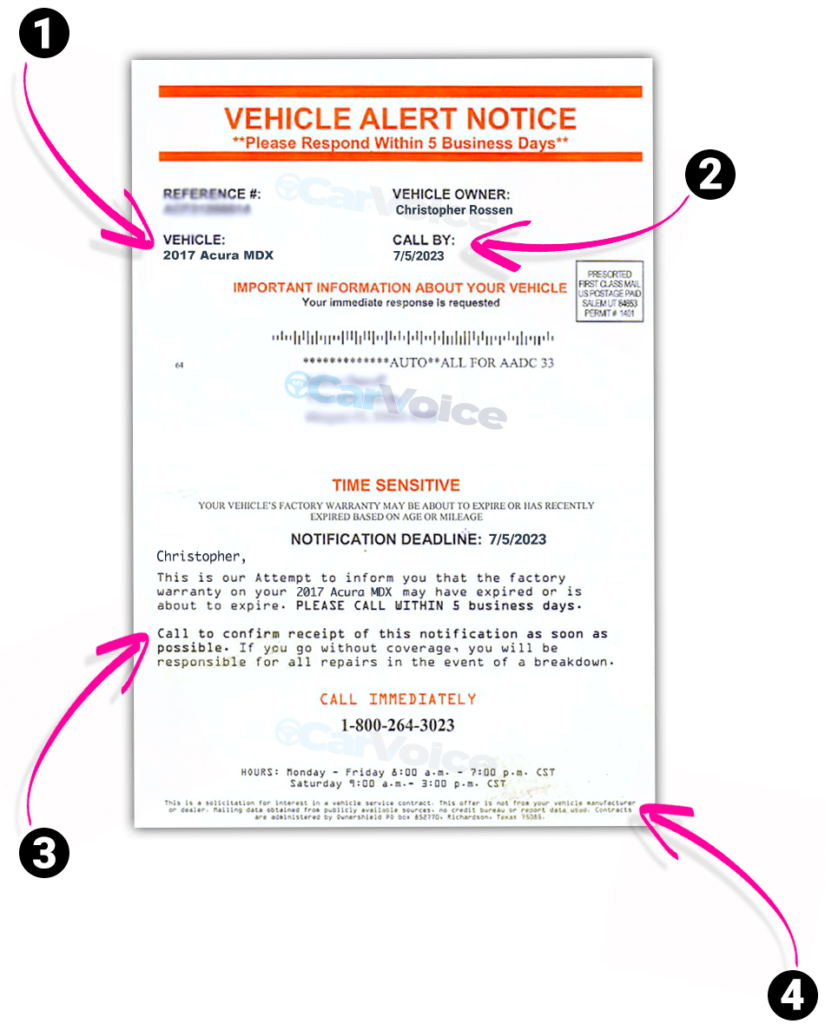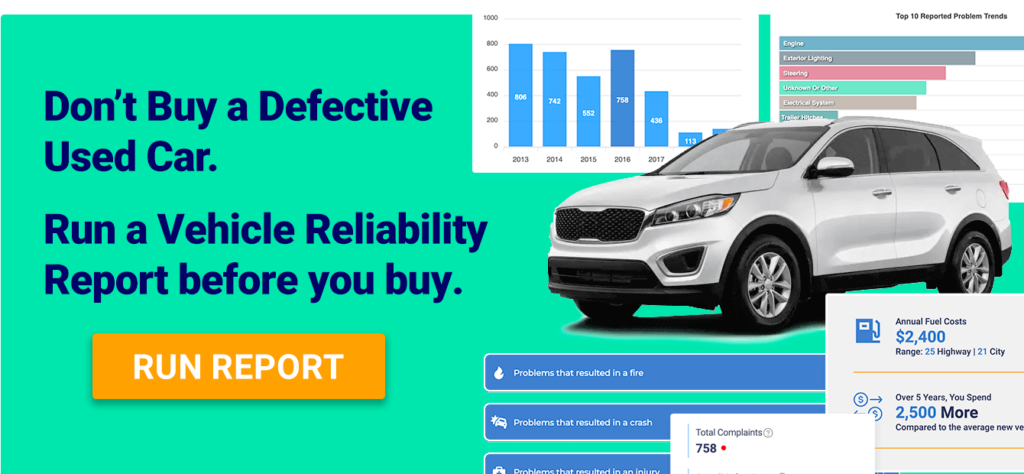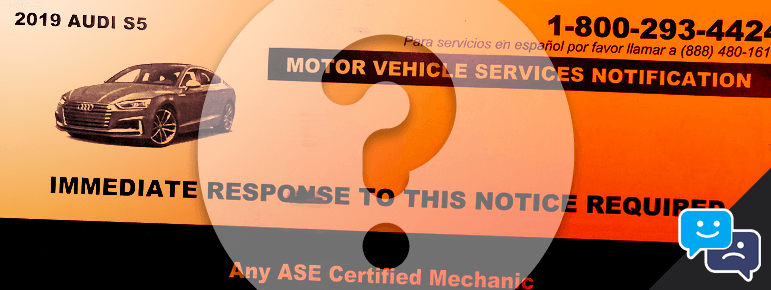Last Updated on December 5, 2023
Had a ‘Vehicle Services Division’ letter land in your mailbox? It isn’t uncommon. These letters will likely say that you need to make a payment to keep your warranty. Or claim that you haven’t activated your existing warranty. Before you reach for your phone, it may be worth asking yourself, is this Vehicle Services Division letter a scam?
In most cases, a Vehicle Services Division letter is a scam. Scammers send these letters en masse hoping to get a few bites. However, some letters are genuine and alerting you that your warranty is expiring. If the letter has the date your warranty expires, and the number of miles you have driven, then the letter is authentic.
While at first glance, the letter could appear to be an official notification from a government agency or another reliable company. But, the Federal Trade Commission strongly advises against trusting these offers for vehicle warranties.
In fact, the companies behind such messages often create an illusion of being affiliated with your car dealer or manufacturer. In reality, their intention is most likely to sell you a service contract.
And 99% of the time, these companies sending the letters are not even associated with your car dealer or manufacturer in any way.
If you decide to respond to their offers, they will likely pressure you into disclosing personal financial information and demand an immediate down payment.
But beware! Many of these companies might not even be in business when the time comes for you to utilize the warranty coverage.
In this guide, we’ll look into the details of these letters to help you identify what a Vehicle Services Division letter is. And more importantly, how you can determine whether you’re looking at a real warranty notification or a scam.
Let’s dive into this!
What is a Vehicle Services Division Letter?
Simply put, a Vehicle Services Division letter is a letter that either:
- Says that your vehicle’s warranty is expiring.
- Says that you have yet to activate your vehicle’s warranty.
- Comes from a third-party warranty company trying to get you to buy one of their warranties.
The design of these letters can vary. Most will have VEHICLE SERVICES DIVISION emblazoned on the top of the envelope and letter. You may also see the words ALERT and PERSONAL & CONFIDENTIAL.
It’s even possible the letter has some basic details about your vehicle. There will be a phone number to call. In rare cases, there may be a website link too.
These letters are often encouraging you to give the sender a call to make a payment or buy monthly coverage. Keep in mind, it may not necessarily say that you need to make a payment on the letter. But, as soon as you reach somebody on the phone, they’ll ask for some cash.
In most cases, these letters will say that if you don’t pay now, you could end up having to pay some hefty repair fees later on.
This is how most scams work. They make it seem as if it is ‘urgent’ that you hand your cash over. It gives people a lot less time to think about things.
Truth is, it pays to be skeptical when handling such documents. So get ready to investigate the facts and find out what has really been sent your way.
How to Recognize a Vehicle Services Division Scam Letter
If you’re trying to spot a fake vehicle services notification letter, here are four telltale signs to watch out for:

- Identification of the vehicle you currently own
- Immediate response required language
- Intimidating wording to call immediately, or to confirm receipt of notification letter
- At the very bottom of the letter, look for three small lines of text that may read similar to this: This is a solicitation for interest in a vehicle service contract. This offer is not from your vehicle manufacturer.
Is a Vehicle Services Division Letter a Scam?
99% of the time – yes a Vehicle Services Division letter is a scam. The problem is that, unless you know what you’re looking for, it may seem like an official notification from the vehicle manufacturer.
While some scam Vehicle Services Division letters are sent out to hundreds, if not thousands of people, most are not.
A lot of these letters are highly targeted. When you receive one, it may have your name or basic details about your vehicle on it. Truth is, this information can be gathered from your vehicle’s VIN.
However, just because your personal details are included in the letter, it doesn’t mean that you aren’t about to be scammed.
Let’s run you through some of the things that you need to think about before determining whether the Vehicle Services Division letter is a scam.
Always Assume it is a Scam
First things first, when you receive a Vehicle Services Division letter, always assume it is a scam. As we said, there is a 99% chance you are going to get scammed if you call the number on the letter. So, if you can’t work out whether the letter is real or fake, then assume it is a scam. You’ll probably be correct.
Remember, if you call one of these numbers, the person on the other end of the line will try and get financial information from you. They are pros at it. Even if you think you’ll never hand your details over, you’ll be surprised at how convincing some of these scammers are.
You Won’t Receive Random Letters From Your Vehicle’s Warranty Provider
A scam Vehicle Services Division letter can arrive at any time. In fact, some people receive them when they don’t even own a vehicle!
Perhaps the best way to tell whether the letter is real is to check when your vehicle’s factory warranty expires. Most vehicle warranties last 3-5 years or a certain number of miles.
If you aren’t anywhere close to the expiration of your warranty, then we can guarantee that your warranty provider won’t be sending you any letters.
So, if you’ve received a letter within months of a vehicle purchase (or you don’t even own a vehicle), then throw it away. That’s a scam letter.
Check to see if The Company Name & Number Matches Up With Your Vehicle’s Warranty
Most scam Vehicle Services Division letters won’t have a company name or even a website address on them. It will just be a phone number. If you don’t see a company name, then right away you know it is a scam.
If there is a company name then make sure of the following:
- It matches the name of your vehicle’s warranty provider (check your paperwork).
- The phone number matches the phone number for your vehicle’s warranty provider.
Remember, scammers can get basic details about your vehicle, but they’ll rarely have correct information about your warranty provider.
Has The Correct Information About Your Vehicle
As we said, scammers are sophisticated. They can get a lot of information about your vehicle (from publicly accessible databases). This can give the illusion that the letter is real.
However, there are some pieces of information that scammers can’t get. So, if you don’t see this information listed on the Vehicle Services Division notification, you know you’re dealing with a scammer.
- Date your vehicle’s warranty expired.
- The number of miles you have driven (this will be recorded at your yearly service, for warranty purposes).
- The price you paid for your vehicle.
Claim to be Able to Extend The Factory Warranty
No company other than the car manufacturer itself can extend your car warranty. Fact is, these warranty scams make it impossible to get coverage when needed.
In Doubt? Call Your Vehicle’s Warranty Provider
Remember, if in doubt, always assume that the letter that you have received is a scam. However, if the letter has arrived exactly when you expect it to arrive (i.e. your factory vehicle’s warranty is expiring), then give your vehicle’s warranty provider a call.
Use the phone number from the paperwork you received from the dealership, not the number on the Vehicle Services Division letter.
Contacting the vehicle manufacturer is the best way to determine if your warranty has indeed expired.
Vehicle Services Division FAQs
How do car warranty companies get your information?
Third-party warranty companies use vehicle and address information along with publicly available mailing lists to find names and phone numbers of individuals whose cars may be approaching the end of their factory warranty periods.
How do I stop getting car warranty mail?
To reduce the amount of unwanted junk mail, you can register for the Direct Marketing Association’s mail preference service. While it may not eliminate all unsolicited mail, it is a helpful step. There is a $4 fee for ten years of service.
How do I find the phone number for my vehicle’s factory warranty?
To find your vehicle’s factory warranty phone number, check the owner’s manual or the manufacturer’s website. If you bought the car from a dealership, ask them for the number. Otherwise, contact the manufacturer’s customer service with your vehicle’s VIN.
What Happens if I Fall Prey to This Warranty Scam?
Contact the Federal Communications Commission (FCC) or the Federal Trade Commission (FTC) to file a complaint immediately. The FTC may be able to help issue a refund.
Final Thoughts: Vehicle Services Division Letter
Simply put, it is important to be aware of fraudulent Vehicle Services Division letters that may make their way to your mailbox. It is usually best to not trust scammers who send these offers, as they often create an illusion of being affiliated with your car dealer or manufacturer and demand an immediate down payment.
Always double check the source of the letter before giving away any personal financial information. If there is no indication that the letter came directly from your car dealer or manufacturer and a warranty expiration date isn’t included, it’s much better to be safe than sorry.
If you have encountered an extended warranty scam, it is important to report it to the Federal Trade Commission (FTC) and your state’s attorney general office.
In case the scammer reached out to you via phone, you can also report the call to the Federal Communications Commission (FCC). This helps to protect yourself and others from falling victim to these fraudulent activities.
Do not bite on a scammers bait, and never feel compelled to respond just because they sent you a letter, even if the envelope and letter looks official.
Recently received a Vehicle Services Division letter and need help identifying if it’s real or not? Leave your comment below and we will help. 👇


Managing Editor
Christopher is an automotive technical writer. When he’s not at the local autocross event, he can often be found working on one of his cars. Specializes in automotive class action law, industry trends, and automotive maintenance. Email me direct, or learn more about us


S
March 10, 2024 at 3:04 pmI have received four letters so far from these scammers… but the name of the person is someone else with my address!
jennifer moran
January 7, 2024 at 3:27 amok, so let’s say this is a SCAM…what if I actually need to repair my car (which btw I bought used from a mom and pop’s dealer)…calling them voluntarily to have my car repaired without of course mentioning the letter they sent but say that I got their number from one of the “papers” I was handed when I bought the car and now im in dire need of repair, and I’m basically cashing in or utilizing the services that they swear they have covered in my warranty? and come up with a convincing and detailed story detailing the urgency my car is in need of fixing before my “expiration is up”? what things should I prepare for in regards to them calling my bluff? I’m just saying….I kinda have the time on my hands to do this and need something temporary to keep me busy and get my car fixed or not in the meantime? thank you for the advice and having this site and article posted.
Christopher Rossen
January 18, 2024 at 3:30 pmJennifer, it’s important to ensure that you have the dealership’s warranty documented in writing. Once you have it in hand, carefully review the fine print to confirm whether the problem you’re experiencing is covered. Additionally, be aware that some small dealerships may advertise a “full warranty,” but it often hinges on all maintenance and servicing being carried out exclusively at their location. Failure to comply with this requirement may render any third-party warranty void. Wishing you the best of luck with this matter.
Lara
November 1, 2023 at 6:08 amI’ve been receiving the same “final notice” for over a year at a motel address that not many people know. But, I already knew it was a scam 1) I’ve never owned the vehicle they’re talking about 2) they don’t leave a return address on the “final notice” letter, EVER!!
Dominic
October 14, 2023 at 2:39 amhaha!! jeez, these scammers are pretty tricky little dudes, gotta hand it to them. the letter I received looked very well done and polished. Even had a *$199 Fee Voucher* attached at the bottom which looks eerily like a legitimate check of sorts. written was some basic info about myself and my NEWLY purchased 2023 VEHICLE. Of course, although never receiving anything prior to this letter, this was my FINAL NOTICE!! MUST CONTACT IMMEDIATELY OR ELSE LOSE COVERAGE IF NOT LOST ALREADY! All very urgent stuff. I knew after reading it thru and seeing NO WEBSITE, NO COMPANY NAME, AND NO AFFILIATION WITH MY DEALERSHIP OF MANUFACTURER….. of course a scam. my vehicles barely a year old at this point…. I do appriciate your words of wisdom here that confirmed my suspsions. from here, what do I do? Should I;
• dispose, and otherwise not look back? Or,
.• should I be contacting the FCC/FTC or some other official outfit and submit something/some info regarding this letter, alongside their phony ‘VEHICLE SERVICES DIVISION’ name and number that was given?
Again— appriciate having someone with real integrity and a soul (these days, almost unheard of….) by posting this site with the plethora of info about these tactics, as well as the very detailed ways of figuring out what’s what, and who’s who—legitimately. A huge sigh of relief came from my wife once I read to her your words here that had corroborated what I already figured was the situation…. really put us both at ease 100%. Bc even having that 1% or 2% of doubt is enough stress to sit with — unfairly might add…
And all at our expense while these scammers concieve and plot these con’s into our pockets. As if there isn’t enough BS going on that we all have to deal with already. Sorry for being a bit long-winded, but I’m sick to death of all these scams going on lately— this one here isn’t my first that I’ve been sent either—more like…. jeez.. the 4th. And that’s those just by mail…All appeared very legit.
I wish there was more that could be done about this…and if there is, could someone point me the right direction?
Thanks again!!
Christopher Rossen
October 24, 2023 at 10:43 amDominic, it depends on how much time you want to invest in chasing these companies down? Hopefully this post is helpful in helping identifying these scams.
Andrew
September 5, 2023 at 5:36 pmI don’t understand why don’t the authorities do something about this scam. It can’t be that difficult to stop. My brand new car is 6 weeks old and I have a received this very official letter looking letter from Vehcile Services Division
Christopher
September 20, 2023 at 11:17 amAndrew, it’s legal because it’s a form of advertising basically. While it’s absolutely misleading, due to rights of commerce and free speech, there really isn’t anything authorities lawfully can do.
Lara
November 1, 2023 at 6:10 amI have had SEVERAL $199 vouchers that “Are not checks” for over a year for a car I’ve never owned or ridden in… They aren’t too clever LoL trust me
Angel
August 13, 2023 at 2:03 amReceived letter about car warranty through the vehicle services division. Where do I go online to research this and access my information?
Christopher Rossen
August 14, 2023 at 11:51 pmAngel, this is most likely a scam letter. Please check your records and confirm who you have warranty coverage with before contacting anyone. Hope this helps.